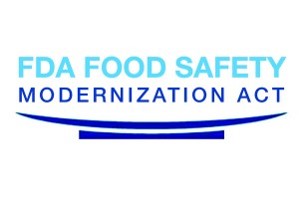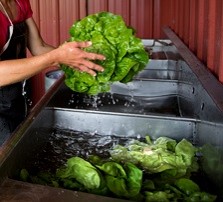It seems like years ago that the Food Safety Modernization Act (FSMA) was signed into law, but it was actually 2011. With a new congress convening this week, and the inauguration of President-Elect Donald Trump on January 20th, the outlook for FSMA is unpredictable. Whatever the future may hold, there are a number of important food safety compliance facts you should know.
Exempt/Excluded Status
Depending on the size of your farm, what you grow, or your clientele, you may be exempt or excluded from FSMA. Whatever your status may be, it is important that you understand food safety protocol and that you proactively and reactively reduce food safety risks on your farm.
- Farms that have an annual value of produce sold of $25,000 (based on a three year average, adjusted for inflation) or less are not covered by the regulation.
- The farm must have food sales less than $500,000 per year (based on a three year average, adjusted for inflation) AND the farm’s direct sales to qualified end-users must exceed sales to all buyers combined during the previous three years. (A qualified end-user is either the consumer of the food or a restaurant or retail food establishment that is located in the same state or the same Indian reservation as the farm or not more than 275 miles away.)
- Produce Not Covered by the Regulation
- Produce commodities that FDA has identified as rarely consumed raw: asparagus; black beans, great Northern beans, kidney beans, lima beans, navy beans, and pinto beans; garden beets (roots and tops) and sugar beets; cashews; sour cherries; chickpeas; cocoa beans; coffee beans; collards; sweet corn; cranberries; dates; dill (seeds and weed); eggplants; figs; ginger; hazelnuts; horseradish; lentils; okra; peanuts; pecans; peppermint; potatoes; pumpkins; winter squash; sweet potatoes; and water chestnuts.
- Produce that is used for personal or on-farm consumption.
- Produce that is not a raw agricultural commodity. (A raw agricultural commodity is any food in its raw or natural state.)
- A farm with the qualified exemption must still meet certain modified requirements, including prominently and conspicuously displaying the name and the complete business address of the farm where the produce was grown either on the label of the produce or at the point of purchase.
Compliance Deadlines
Required compliance dates are set based on farm size – the larger the farm, the sooner it will need to be in compliance.
- Very small businesses, defined as greater than $25,000 but less than $250,000 in average annual (previous three year period) produce sales, will need to comply with the regulation within four years.
- Small businesses, defined as greater than $250,000 but less than $500,000 in average annual (previous three year period) produce sales, will need to comply with the regulation within three years.
- All other businesses, defined as greater than $500,000 in average annual (previous three year period) produce sales, will need to comply with the regulation within two years of the effective date.
- Compliance dates for farms eligible for qualified exemptions are:
- Labeling requirements (if applicable): January 1, 2020
- Retention of records supporting eligibility for a qualified exemption: Effective date of final rule (January 26, 2016)
- For all other modified requirements for farms growing covered produce other than sprouts: Very small businesses—4 years, Small businesses—3 years
Note: The compliance dates for certain aspects of the agricultural water requirements allow an additional two years beyond each of these compliance dates.
Employee Training
Regardless of whether your farm has implemented a food safety plan or not, the FDA requires approved training under the FSMA Produce Safety Rule.
- At least one supervisor or responsible party from a farm subject to the FSMA Produce Safety Rule must have successfully completed food safety training, at least equivalent to the standardized curriculum recognized as adequate by the FDA.
- All workers that handle or contact covered produce or supervise workers must be trained based on FSMA standards. Everyone working on the farm should receive annual instruction on how to accomplish his/her job. Standard Operating Procedures (SOPs) should be developed to provide clear step-by-step instructions for how workers should complete their daily tasks.
- Visitors to the farm must be made aware of food safety policies set by the farm, and visitors must have access to toilet and handwashing facilities.
To read more on FSMA, please visit The Food Safety Modernization Act and the FDA Facility Registration Program.
An approved Food Safety Training is scheduled for February 13 in Marianna at the Jackson County Extension Office. For more information, and to register for the training, please visit:
Farm Food Safety Certification Training – February 13
- Crops to Consider for Fall Planting - September 26, 2025
- Benefits of Manure Fertilizers and Analysis - March 21, 2025
- Mushrooms – A Crop Worth Consideration for the Back Forty - October 4, 2024


